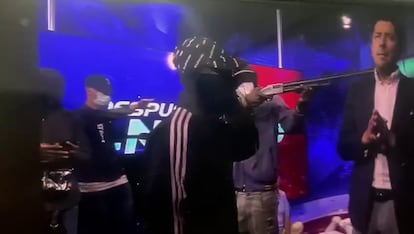Daniel Noboa declares an ‘internal armed conflict’ in Ecuador after an armed commando breaks into a television station live on air
The dire security crisis escalated over the weekend following the escape of Fito, the country’s most dangerous criminal


The president of Ecuador, Daniel Noboa, declared on Tuesday the existence of an “internal armed conflict” in the country, which entails the immediate deployment and intervention of security forces against organized crime. The country is currently experiencing an unprecedented upsurge in terror and violence. At two o’clock in the afternoon, the broadcasting of TC Televisión was interrupted as an organized criminal group took the journalists hostage. In a live nationwide broadcast, the whole country witnessed how about ten hooded and armed men aimed their guns at the workers of the channel in the city of Guayaquil. During almost half an hour of live coverage, in which the journalists begged not to be harmed, shots were heard on the television set. Afterwards, the signal was cut.
The president, who began his term less than two months ago, has made the decision to declare a state of war one day after decreeing a nighttime curfew. He has also declared 22 organized crime groups as terrorist groups and has ordered the Armed Forces to carry out military operations to neutralize them.
The channel’s live images showed several hooded men threatening workers and demanding them to ask the police, who had arrived on the scene, to leave. The officers, however, managed to gain access to the interior and two hours after the seizure, they managed to rescue the hostages and arrested 13 assailants.

The wave of attacks that for three days has gripped the country escalated on Tuesday, especially in Guayaquil, the country’s most populated city and the epicenter of the dire security crisis that is suffocating Ecuadorians. In the coastal city, a group of criminals also tried to enter the Teodoro Maldonado Carbo Hospital. Videos are circulating on social media of students at the University of Guayaquil locked in their classrooms to get to safety from the alleged criminals who reportedly entered the school, and at the University of Machala, on the Ecuadorian coast, there were also moments of chaos with students and staff running desperately out of the institution after suspects entered the premises.
In Quito, the capital, the situation is also sensitive, several businesses have been forced to close due to looting. Around three o’clock in the afternoon, officials of the Carondelet Palace, in the historic center, and other state institutions have been evacuated for security. The traffic chaos in the capital at this time is greater than any other day and several shopping malls in Quito, Guayaquil and Manta have closed their doors.
Six prisons have been seized since last weekend by prisoners who kidnapped penitentiary agents and triggered unrest inside the centers. Tension increased after José Adolfo Macías, alias Fito, the most dangerous criminal in Ecuador, escaped from the Regional prison of Guayaquil, with four other people who are part of his security ring. The authorities of SNAI, the entity in charge of prisons, found out during an operation to control weapons and prohibited objects carried out by the police and the Armed Forces on Sunday morning, when they found Fito’s cell, decorated with his image, empty.
The government has yet to acknowledge the escape of the leader of criminal gang Los Choneros, and has only said that he “is missing.” However, Ecuador’s Attorney General’s Office has filed charges for the alleged escape against two prison officials who are suspected of involvement in the escape.
The escalation of violence was a time bomb that has exploded in Noboa’s hands. The country, at historic levels of insecurity with 40 homicides per 100,000 people, was waiting for the new president’s project to tackle violence and gain control of prisons to materialize. The state taking control of the prisons, where 31,300 people are incarcerated, is part of the security strategies that the last three governments have promised without success.
So far, it has not been possible to break the direct link between prisons and the violence that is worsening every day in the streets. From their cells, the leaders of criminal gangs direct and order assassinations, attacks, extortion and manage the logistics for drug trafficking, all under the protection of the state, which is responsible for the country’s jails, which are guarded by police, military and civilians.
Sign up for our weekly newsletter to get more English-language news coverage from EL PAÍS USA Edition
Tu suscripción se está usando en otro dispositivo
¿Quieres añadir otro usuario a tu suscripción?
Si continúas leyendo en este dispositivo, no se podrá leer en el otro.
FlechaTu suscripción se está usando en otro dispositivo y solo puedes acceder a EL PAÍS desde un dispositivo a la vez.
Si quieres compartir tu cuenta, cambia tu suscripción a la modalidad Premium, así podrás añadir otro usuario. Cada uno accederá con su propia cuenta de email, lo que os permitirá personalizar vuestra experiencia en EL PAÍS.
¿Tienes una suscripción de empresa? Accede aquí para contratar más cuentas.
En el caso de no saber quién está usando tu cuenta, te recomendamos cambiar tu contraseña aquí.
Si decides continuar compartiendo tu cuenta, este mensaje se mostrará en tu dispositivo y en el de la otra persona que está usando tu cuenta de forma indefinida, afectando a tu experiencia de lectura. Puedes consultar aquí los términos y condiciones de la suscripción digital.








































